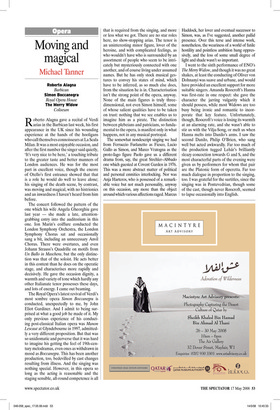Moving and magical
Michael Tanner
Roberto Alagna Barbican Simon Boccanegra Royal Opera House The Merry Widow Coliseum
Roberto Alagna gave a recital of Verdi arias in the Barbican last week, his first appearance in the UK since his wounding experience at the hands of the hooligans who call themselves connoisseurs at La Scala Milan. It was a most enjoyable occasion, and after the first number the singer said quietly, ‘It’s very nice to be here,’ a touching tribute to the greater taste and better manners of London audiences. He was for the most part in excellent voice, though the encore of Otello’s first entrance showed that that is a role he would do well to leave alone; his singing of the death scene, by contrast, was moving and magical, with no histrionics and an inwardness I haven’t heard from him before.
The concert followed the pattern of the one which his wife Angela Gheorghiu gave last year — she made a late, attentiongrabbing entry into the auditorium in this one. Ion Marin’s coiffure conducted the London Symphony Orchestra, the London Symphony Chorus sat and occasionally sang a bit, including an unnecessary Anvil Chorus. There were overtures, and even Johann Strauss’s Quadrille on motifs from Un Ballo in Maschera, but the only distinction was that of the soloist. He acts better in this context than he does on the operatic stage, and characterises more rapidly and decisively. He gave the occasion dignity, a warmth and variety of tone which hardly any other Italianate tenor possesses these days, and lots of energy. I came out beaming.
The Royal Opera’s latest revival of Verdi’s most sombre opera Simon Boccanegra is conducted, unexpectedly to me, by John Eliot Gardiner. And I admit to being surprised at what a good job he made of it. My only previous experience of his conducting post-classical Italian opera was Manon Lescaut at Glyndebourne in 1997, admittedly a very different proposition. But that was so unidiomatic and perverse that it was hard to imagine his getting the feel of 19th-century melodramas, even ones as withdrawn in mood as Boccanegra. This has been another production, too, bedevilled by cast changes resulting from illness. And the singing was nothing special. However, in this opera so long as the acting is reasonable and the staging sensible, all-round competence is all that is required from the singing, and more or less what we got. There are no star roles here, no show-stopping arias. The tenor is an uninteresting minor figure, lover of the heroine, and with complicated feelings, as who wouldn’t have who is surrounded by an assortment of people who seem to be intricately but mysteriously connected with one another, and of course living under assumed names. But he has only stock musical gestures to convey his states of mind, which have to be inferred, as so much else does, from the situation he is in. Characterisation isn’t the strong point of the opera, anyway. None of the main figures is truly threedimensional, not even Simon himself, some of whose salient qualities have to be taken on trust: nothing that we see enables us to imagine him as a pirate. The distinction between plebeians and patricians, so fundamental to the opera, is manifest only in what happens, not in any musical portrayal.
The somewhat nondescript singing we had from Ferruccio Furlanetto as Fiesco, Lucio Gallo as Simon, and Marco Vratogna as the proto-Iago figure Paolo gave us a different drama from, say, the great Strehler–Abbado one which guested at Covent Garden in 1976. This was a more abstract matter of political and personal enmities interlocking. Nor was Anja Harteros, who is possessed of a remarkable voice but not much personality, anyway on this occasion, any more than the object around which various affections raged. Marcus Haddock, her lover and eventual successor to Simon, was, as I’ve suggested, another pallid presence. Over this terse and intense work, nonetheless, the weariness of a world of futile hostility and pointless ambition hung oppressively, and the loss of some small degree of light and shade wasn’t so important.
I went to the sixth performance of ENO’s The Merry Widow, and though it was no great shakes, at least the conducting of Oliver von Dohnanyi was suave and urbane, and would have provided an excellent support for more suitable singers. Amanda Roocroft’s Hanna was first-rate in one respect: she gave the character the jarring vulgarity which it should possess, while most Widows are too busy being ironic and romantic to incorporate that key feature. Unfortunately, though, Roocroft’s voice is losing its warmth at an alarming rate, and she wasn’t able to stir us with the Vilja-Song, or melt us when Hanna melts into Danilo’s arms. I saw the second Danilo, Philip O’Brien, who sang well but acted awkwardly. Far too much of the production tugged Lehár’s brilliantly sleazy concoction towards G and S, and the most characterful parts of the evening were given us by performers for whom that pair are the Platonic form of operetta. Far too much dialogue in proportion to the singing, too. I was grateful for the surtitles, since the singing was in Pontevedrian, though some of the cast, though never Roocroft, seemed to lapse occasionally into English.










































































 Previous page
Previous page